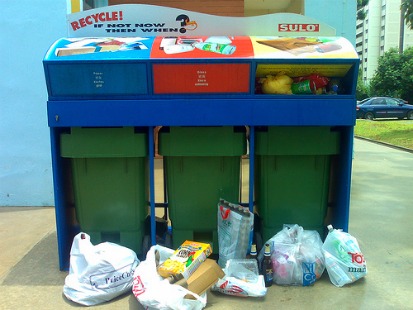Send your question to Umbra!
Q. Dear Umbra,
My neighbors do not recycle appropriately — they throw in frozen food boxes, bag their recyclables in plastic bags and who knows what else! Does that mean that all my efforts are in vain?
Elizabeth Raley
submitted via Facebook
 What can you do about a neighbor who messes up the garbage?Photo: Jerry WongA. Dearest Elizabeth,
What can you do about a neighbor who messes up the garbage?Photo: Jerry WongA. Dearest Elizabeth,
I suggest hiding in the bushes and performing a citizen’s arrest. Practice your air-handcuff moves, and once you spy the offending neighbors hauling yet another plastic bag full of junk mail out to the curb, leap out and drag them off to a teetering fort built of discarded plastic straws and credit card offers.
I kid, of course. But you raise a curious thought: What happens to the improperly mixed bag o’ stuff? Here’s what the good people at the Seattle Service Bureau told me: If there are recyclables mixed in with the trash, unfortunately it most likely ends up at the landfill. (Paper products make up over 40 percent of landfills.) If there is trash obviously mixed in with the recyclables, some recycling collectors won’t pick it up and will affix a pre-printed sticker to the bin informing the resident of the problem (as they will also do if the lid isn’t on correctly, and other common minor infractions).
Collectors have an incentive to do this, because they can be fined [PDF] for giving material recovery facilities improperly mixed recyclables. “If a recycling company tries to sell a bale of corrugated cardboard that has chipboard [what cereal boxes are made of] mixed into it, the buyer might refuse not only the bale in question, but anything else that recycling company tries to bring in later,” says the Washington State Department of Ecology. If you live in an apartment, talk to your landlord or building manager. As they’re paying for your trash and recycling service, they have a vested interest in not having anything refused.
While we’re talking recycling tips, remember that “cleanliness is essential,” says Seattle’s Waste Management — especially regarding plastic. “One dirty product, or one with food waste still in it, can contaminate an entire bale containing thousands of pounds of collected plastics.” Oh my. A good reminder.
Nextly, what are you to do about those neighbors? It’s disheartening when one’s eco-diligence is not shared (and is seemingly thwarted, as if by a mischievous garbage gnome mixing in those Lean Cuisine boxes with a devious cackle). However, it’s also an opportunity for you to gently educate your neighbors about recycling best practices (assuming sheer ignorance is the case rather than laziness or malevolent gnomes).
Is there a neighborhood newsletter you can submit a short piece to, reminding others what can’t be recycled or pointing them to the website of your local recycling service? (Exactly what can and cannot be recycled varies by city. Here in Seattle, a cartoon envelope named Evelyn awaits confused would-be recyclers with a Choose Your Own Adventure-style online tool.) Or, if you’re brave, try a soft tap on their door followed by “Hey! You’re gonna think I’m crazy, but I’m really passionate about recycling, and there’s been some confusion in our ‘hood about the best way to do it, which is [whatever it is].” Be as kind and understanding as possible. We all have our foibles (I’m a sucker for a soak in a toasty Jacuzzi). And in the end, reducing and reusing are even more important R’s to keep in mind.
Don’t fret, my dear! And when your neighbors get recycling right, burst into spontaneous applause like this flash mob.
Good-neighborly,
Umbra



